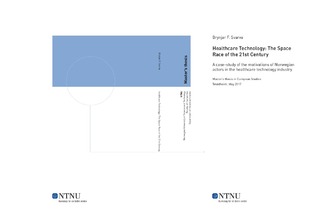| dc.description.abstract | This thesis aims at analyzing Norwegian healthcare technology actors’ motivations for working in the healthcare sector, and to what extent the EU, and in particular the Horizon 2020 research program, affect these motivations. A fair amount of research has gone into mapping why researchers and a diverse range of actors may choose to participate in H2020 projects, and why they might choose to abstain. The Norwegian government has a clear intention to make Norway a major participant in EU research programs, increasing the H2020’s impact on Norwegian research and business. We ask not the question whether H2020 has affected Norwegian innovation and research – it quite clearly has – but rather the question if it affects the innovators and researchers’ motivations to work in healthcare in the first place.
The healthcare sector is in major growth, providing new and lucrative business opportunities for those who are able to assert themselves. Healthcare is also unique in the sense that it focuses on human lives, how to take care of each other, improving quality of life and how to prevent and cure diseases. Because of this, I have applied a theoretical framework consisting of rational choice theory, and the concept of logic of appropriateness. These two concepts explain the two possible outcomes that I want to explore: whether people work in healthcare because of self-rewarding opportunities, or because of a sense of idealism and altruism.
The thesis’ main finding is that most healthcare actors work with healthcare from a desire to improve healthcare services, a desire to improve patients’ lives, and more or less “do what is right”. This gives support to the logic of appropriateness. However, this does not mean that the rational choice theory is completely disproved. Healthcare actors recognize the need for funding and financial liquidity, or their work would not be possible. Other findings are for example that a sense of prestige and attention for working in high-level projects may affect motivations, along with advantages of working across borders and learning from others. | nb_NO |
